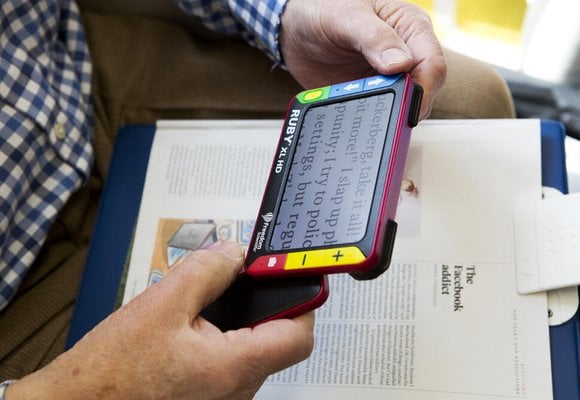After your assessment from your Local Authority SEN team, you’ll want to find your local Low Vision Service. Low vision service provision across the UK is very variable and may be based in a local hospital, located in opticians' practices or offered from a resource centre run by the local society for people with sight loss. To find out more about low vision services in your area, contact a local hospital eye department or speak to your GP, social services (the visual or sensory impairment team) or local society for people with sight loss.
If you no longer see an eye specialist, it may be useful to visit your local optometrist who can carry out an eye health check as well as help signpost you to local services.
A good low vision service will have a wide range of equipment including hand-held magnifiers in a variety of shapes and handles (including those with in-built illumination) and stand magnifiers. They can also establish which low vision aids would be most useful for you. These may include other aids, such as large-buttoned telephones, talking watches and liquid level indicators to help increase your independence in your home.
In England
Low Vision referrals in England can be made through your GP or Eye Clinic as well as by contacting your Local Authority Social Work Department and/or Local Society to arrange an appointment.
In Northern Ireland
Low Vision services in Northern Ireland form part of the hospital service. You can find out more about these services by contacting an RNIB Eye Care Liaison Officer (ECLO). An ECLO can help you link to your relevant Eye Clinic or Low Vision service. Details of your nearest ECLO can be found on the Eye Care Liaison Service RNIB Northern Ireland pages.
In Scotland
Low Vision referrals in Scotland can be made through your GP or Eye Clinic. You can contact your Local Authority Social Work Department and/or Local Society to arrange an appointment.
In Wales
The Low Vision Service in Wales is a free service which provides a range of low vision aids that may be useful to you. Equipment provided includes hand-held magnifiers, task lamps and even high-tech electronic low vision aids. The Eyecare Wales website is the best way to find out more about this service and how it operates in Wales. There are now two ways to search for services on the website. People can either search for services within two, five, 10 or 25 miles from their postcode or they can search for services by county.







